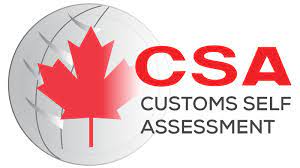CSA (Customs Self Assessment) Information
|
🔖 This article is part of the Customs Compliance Guide |
| This article is about the CSA Program. For how to create a CSA Shipment in BorderConnect, see CSA (CBSA Shipment Type) |
The Customs Self Assessment (CSA) program is designed for low-risk, pre-approved importers, carriers and registered drivers. To take advantage of the program, CSA-approved importers and carriers must use a registered driver to carry CSA-eligible goods into Canada in the highway mode.

The CSA program simplifies many of the import border requirements so that low-risk shipments can be processed more quickly and efficiently at the border, saving businesses time and money.
It also allows the CBSA to better focus its resources on identifying high-risk shipments that pose a potential threat to the health, safety or economic well-being of Canadians.
CSA Program Participation
Participating carriers and registered drivers in the highway mode have the option of clearing CSA-eligible goods more quickly at the border once identification confirms that the importer, carrier and driver have been pre-approved.
With this streamlined clearance process, transactional transmissions of data related to eligible goods are no longer needed.[1][2]
Carriers can also register as a CSA participating carrier by contacting BorderConnect's Carrier Customs Consulting Division
CSA Elgigibility
Carriers eligible to apply to the CSA program must meet these requirements:
- they are bonded ($25,000.00 and over);
- they have a history of transporting goods to or from Canada for at least 90 days;
- they do not have a history of contraband or major commercial infractions;
- they are willing to be liable for and maintain control of all shipments, including CSA-approved shipments, until goods are released; and
- they are willing to provide senior management authorization that proper commercial business processes and audit trails will support CSA program requirements.
CSA Reporting Requirements
CSA reporting requirements support a streamlined border clearance process and vary by mode. CSA clearance is used to request the "authority to deliver" CSA-eligible commercial goods that are imported by a CSA-approved importer. A distinctive feature of the CSA environment is that cargo documents are not required to clear CSA-approved shipments. However, when requested by a border services officer, the reporting CSA-approved carrier must provide satisfactory evidence concerning the discharge of goods imported into Canada. The CSA-approved carrier is required to have the records, systems, audit trails and linkages in place to support the CSA process.
Required information in approved bar-code format:
- the CSA-approved carrier's identification — a four-character carrier code;
- the CSA-approved importer's identification — a 15-digit business number; and
- the registered driver's identification number — highway mode only.
CSA clearance facilitates the direct delivery of eligible goods to the importer, owner or consignee. For more information regarding the presentation of bar codes at the PIL, see Memorandum D3-1-7, Customs Self Assessment Program for Carriers.
Benefits of CSA Program
The CSA program provides many benefits to carriers:
- it ends the transactional transmission of data elements;
- it increases the certainty of expedited customs processing;
- it makes it easier for carriers to meet their obligations; and
- it streamlines the process for legitimate trade.
Other Trusted Trader Programs
- FAST
- Free and Secure Trade, is a joint initiative between CBP and CBSA designed to enhance border security while speeding up the processing of low risk shipments. Carriers that are FAST approved for the U.S. are able to transport FAST shipments, and are afforded special processing at the border including dedicated lanes and front of line line processing in the case of inspections.
- C-TPAT
- Customs-Trade Partnership Against Terrorism is a voluntary public-private sector supply chain security program led by U.S. Customs and Border Protection (CBP). Through this program, CBP works with the trade community to strengthen international supply chains and improve United States border security.
- PIP
- Partners in Protection (PIP) is a cooperative program between private industry and the CBSA aimed at enhancing border and trade chain security. This voluntary program has no membership fee. It is designed to streamline and make border processes more efficient for low-risk, pre-approved businesses recognized as trusted traders.
References
- ↑ http://www.cbsa-asfc.gc.ca/prog/csa-pad/carrier-transport-eng.html
- ↑ CBSA - About the CSA Program http://www.cbsa-asfc.gc.ca/prog/csa-pad/menu-eng.html